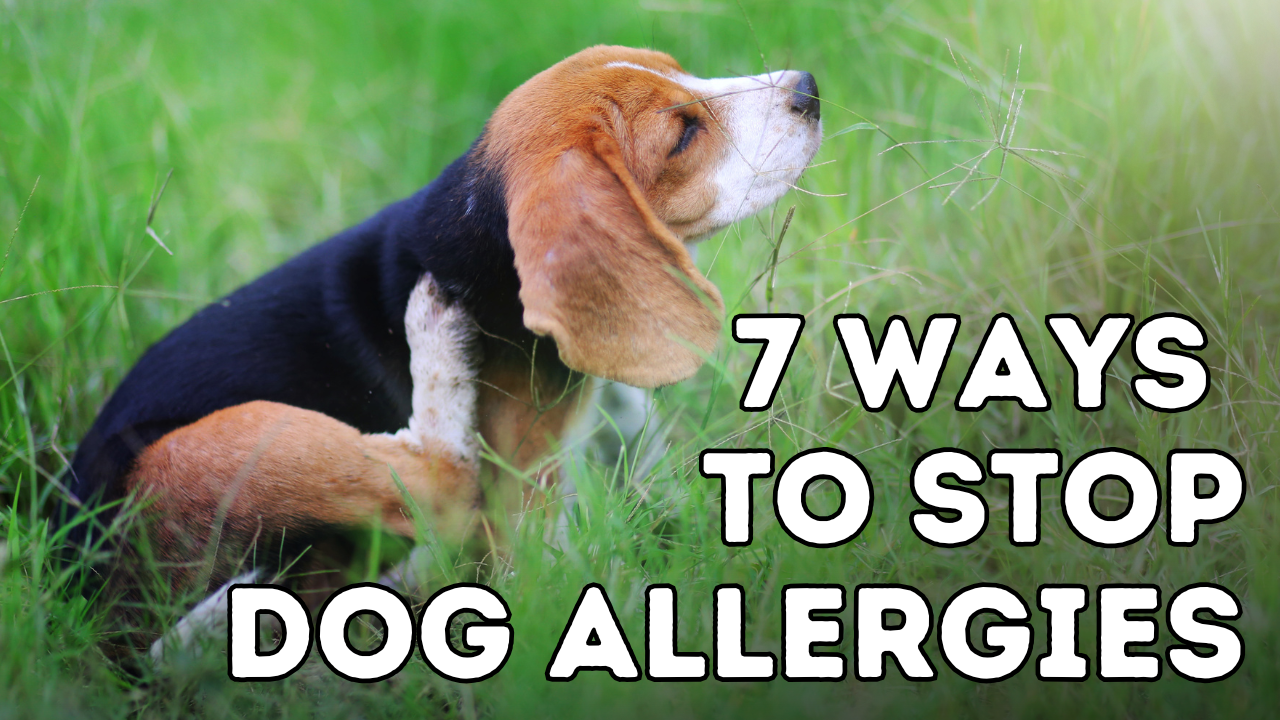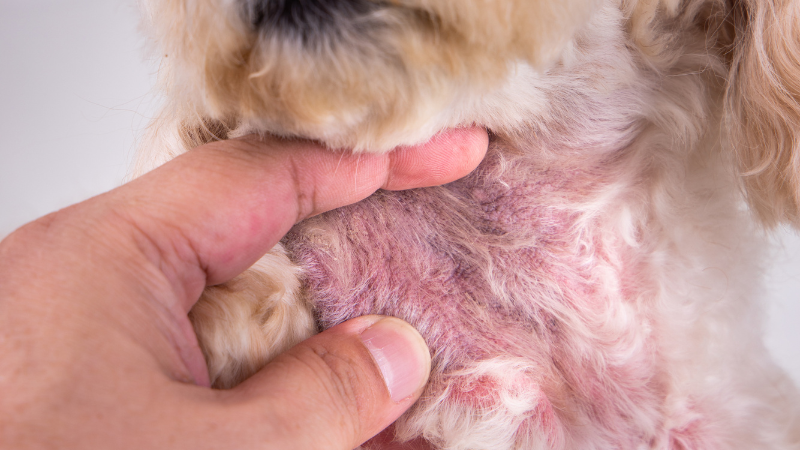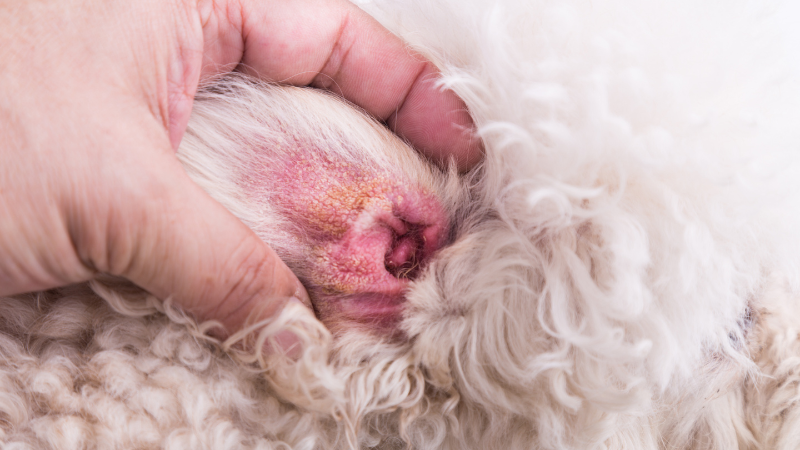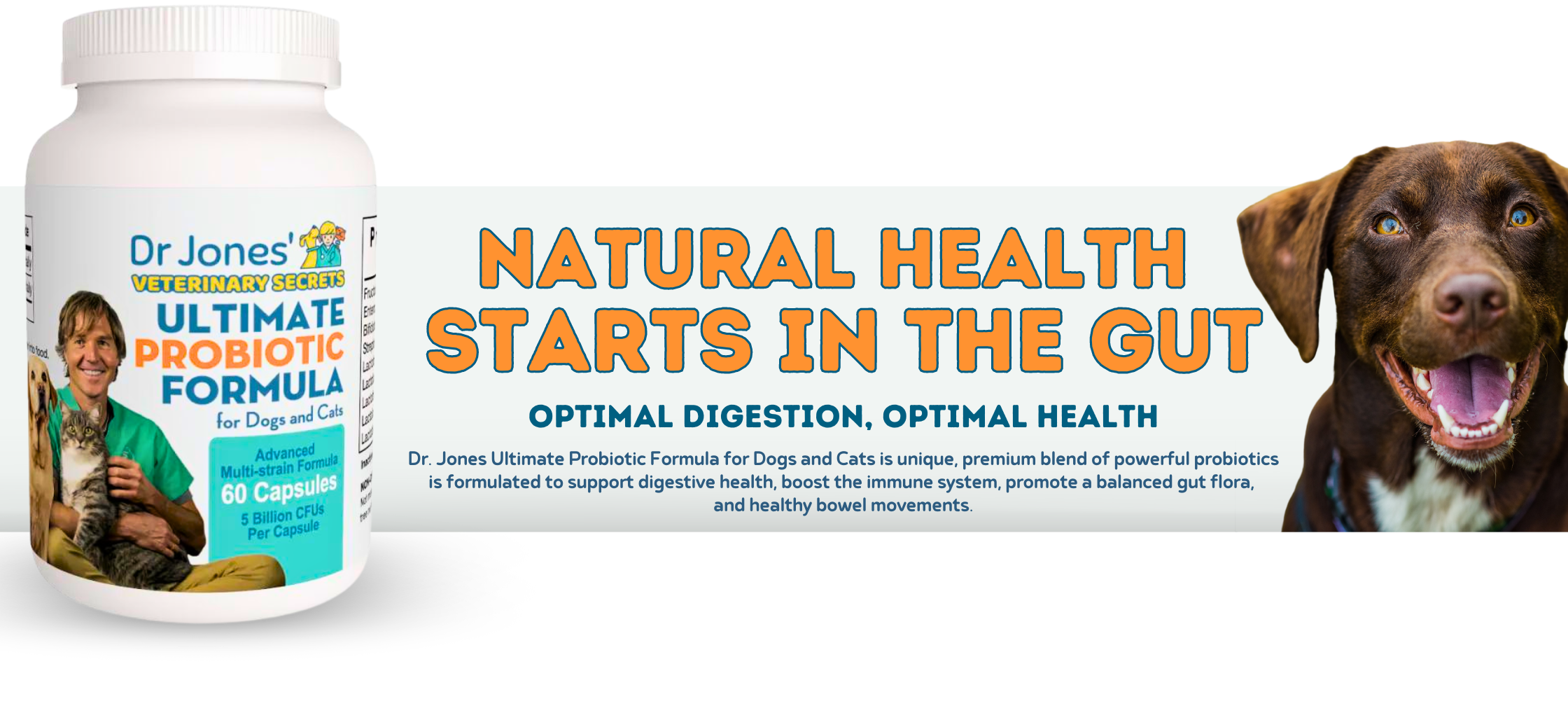Dog Allergies: Top 7 Ways To Stop The Itching Fast

What’s Causing Your Dog to Scratch, Itch, and Lick Excessively?
If your dog is constantly scratching, itching, and licking their paws, chances are they’re dealing with allergies. But the question is—what exactly is causing the reaction? It could be a variety of things: food, grass, house dust mites…the list of allergens goes on and on. Some pets will show signs like runny eyes and sneezing, while others might experience more severe symptoms like recurring skin problems.



One of my own dogs, Jessie, has an allergy that causes him to obsessively lick his groin, especially at night. This can be frustrating for both Jessie and me, and while I feel bad for him, it can also be quite exasperating to hear the constant licking.
So, what can you do to help your dog? Let me share what has worked for Jessie and some tips that could improve your dog’s quality of life.

Understanding the Lifelong Battle with Allergies
If your dog has allergies, it’s likely going to be a lifelong condition. However, there are ways to manage the symptoms and reduce their frequency and severity. Here’s what I recommend:
1. Feed Less Allergenic Food
Start by simplifying your dog’s diet. A commercial food with minimal ingredients, like fish and sweet potato, can work wonders. I’ve found that this combination significantly reduces Jessie’s itching and licking. Remember, there’s no one-size-fits-all when it comes to food allergies, so you may need to experiment. Stick to simple, natural ingredients and avoid artificial colors, flavors, and preservatives. Give the new diet a solid four-week trial to see results.
2. Ensure Adequate Flea Control
Allergies can sometimes be triggered or worsened by fleas. Be sure your dog is flea-free. I recommend using natural flea sprays with cedarwood oil and applying Borax powder in the cracks and crevices of your home as a safe, holistic flea control option.
3. Regular Bathing
Frequent baths can help reduce allergic reactions, especially if you wash your dog’s paws after they come inside. For Jessie, I use an oatmeal shampoo once a week, and twice a week during allergy season. A quick wipe-down with a damp towel after outdoor trips also makes a noticeable difference.
4. Use Antihistamines
Both natural and conventional antihistamines can be helpful. When Jessie’s symptoms flare up, I use Benadryl, dosing at 0.5 mg per pound. For example, Jessie weighs 50 pounds, so I give him 25 mg of Benadryl, usually at night. I also use Vitamin C, which has antihistamine properties, and have noticed a reduction in his itching. The recommended dose of Vitamin C is 100 mg per 10 pounds, given twice daily.
5. Supplement with Essential Fatty Acids
If your dog has allergies, they need to be on Essential Fatty Acid (EFA) supplements. I use my own Ultimate Canine Health Formula, which contains flax oil. For Jessie, I give 1 tablespoon of flax oil per 50 pounds of body weight daily. This provides the omega-3s that help reduce inflammation and itching.
6. Probiotics
Probiotics can help regulate the immune system, which is often overactive in allergic dogs. While you won’t see immediate results, after about four weeks, you should notice fewer allergy symptoms. I use a supplement with lactobacillus and bifidobacterium, but you can also use a probiotic supplement that contains 1/4 capsule of lactobacillus per 10 pounds of body weight twice daily.

7. Colostrum
Colostrum is becoming increasingly popular for treating allergies in dogs. It contains proline-rich polypeptides (PRP), which research shows can reduce allergy symptoms. The dosage varies by brand, but I recommend giving 1/4 of the human dose per 20 pounds of body weight. My Ultimate Canine Health Formula contains colostrum in the correct dosage for dogs.
Don’t Lose Hope—Allergy Relief is Possible
If you have an allergic dog, don’t despair. While the symptoms might not go away overnight, following these steps can make a huge difference. Be systematic and patient, and you’ll be able to improve your dog’s quality of life significantly.
P.S. If you’re looking for a fast and easy way to help with your dog’s allergies, try my supplement, Dr. Jones’ Ultimate Canine Health Formula. It’s packed with essential fatty acids, probiotics, and colostrum, all of which have been shown to help thousands of dogs. See how it can benefit your dog by visiting: www.thedogsupplement.com

i just wanted to add to these solutions
that to add organic oatmeal to thier diet is very good for a dog that is having problems
it has properties to draw the toxins out of the system and dogs love it…
also there is the real unpasturized yogurt
I too have had to deal with a dog with major allergies. I have now figured out that my dog is allergic to Beef, Lamb, Wheat and Potato’s. My dog comes to work with me so I have to be very careful that other people don’t share their lunches with him. I was feeding my dog dehydrated duck as a treat and so I discovered that a number of people at work went out and bought some for him. Next thing I knew, he was eating so much of this that he developed an allergy to duck as well. My question is, is it common for a dog to develop allergies to a food that he eats too much of? I feed my dog a kibble with wild salmon and oatmeal which he seems to do well on but am I risking him developing an allergy to this as well? I have discovered that when he starts scratching an area too much, I spray colloidal silver on the area and that seems to calm it down.
My dog was itching and scratching and I thought it was food allergies at first, but it turned out to be demodectic mange. Fortunately we managed to clear that up and she hasn’t itched since.
I AM HERE A VETERINARIAN. I WAS TAUGHT THAT DOG SHOULD NOT BE BATH REGULARLY AND THEY SHOULD GET BATH UNLESS GREASINESS ON SKIN AND HAIR APPEAR AND SLIGHT ODOR COME FROM DOGS BODY BUT YOU HAVE MENTION THAT I HAVE PRACTICE OF BATHING DOGS TWICE A WEEK.DOES NOT BATHING REGULARLY AFFECT THE SKIN COAT AND HAIRS OF DOGS?
My vets have always told me never to bathe my dog more than once a week since he has skin allergies. Not attacking you, Dr.Jones, just stating what I’ve been told by two different vets. It dries out his skin too much making the condition worse. He has a flea allergy. How convenient, huh? A dog allergic to fleas. Oh boy.
It would be nice to know exactly how long it takes for a pet to react to an allergin, and if some other symtom to the reaction other than itching could help zero in on the cause.
Afer 2.5 years my little morkie still itches. Some days are better than others. After thousands in vet bills I finally sought out a pet nutritionist who helped the most. First my dog would scratch non stop and constantly naw and lick her front paws till she had knots. Vet did an allergy test that said she was somewhat allergic to grass and corn pollen. My dog seldom goes out as shes potty trained so not much grass issues. Anyhow the nutritionist had me switch her to Orjen fish dog food and use an iodine based shampoo. Come to find out my little dog is allergic to grains. No oatmeal baths – grain based dog foods or treats – no more greenies (which are her favorite)etc. It has helped alot where no one else could figure it out. Hope this helps someone else. Cut out all grains for 2 months you will be surprised.
My dog has environmental allergies, she is great all winter but when the snow goes she is an itchy girl. Stopped grains
Hi — that seasonal itch is very common with environmental allergies, especially when pollen and grasses show up in spring. Going grain-free can help some dogs, but there are also gentle natural ways to calm that itchy response.
Dr. Jones covered simple, holistic options here:
? How to Stop Pet Allergies Naturally: Effective Remedies to Stop Pet Allergies
https://veterinarysecrets.com/how-to-stop-pet-allergies-naturally/
It talks about natural anti-inflammatories, allergy support, and skin comfort strategies many pet parents use during allergy season.
Veterinary put the dog on apoquel and hydronized food. Did not cure the symptoms. Nothing did and I tried it all.
Apoquel and hydrolyzed diets can help symptoms, but they don’t always address the root cause of allergies. Chronic itch often has an immune and gut component behind it.
Gentle, natural ways to support dogs like this here:
How to Stop Pet Allergies Naturally: Effective Remedies to Stop Pet Allergies
https://veterinarysecrets.com/how-to-stop-pet-allergies-naturally/
You’re not alone — some dogs need a different kind of support beyond medications.